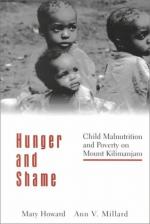|
This section contains 1,127 words (approx. 4 pages at 300 words per page) |

|
Malnutrition occurs when the body does not get enough vitamins, minerals, and other nutrients it needs to maintain healthy tissues and organ function. Both undernourished or over-nourished people can suffer from malnutrition.
Undernutrition is a consequence of consuming too few essential nutrients or using or excreting them more rapidly than they can be replaced.
Infants, young children, and teenagers need additional nutrients. So do women who are pregnant or breastfeeding. Nutrient loss can be accelerated by diarrhea, excessive sweating, heavy bleeding (hemorrhage), or kidney failure. Nutrient intake can be restricted by age-related illnesses and conditions, excessive dieting, severe injury, serious illness, a lengthy hospitalization, or substance abuse.
The leading cause of death in children in developing countries is protein-energy malnutrition. This type of malnutrition results from inadequate intake of calories from proteins, vitamins, and minerals. Children who are already undernourished can suffer from protein-energy malnutrition when rapid growth...
|
This section contains 1,127 words (approx. 4 pages at 300 words per page) |

|


